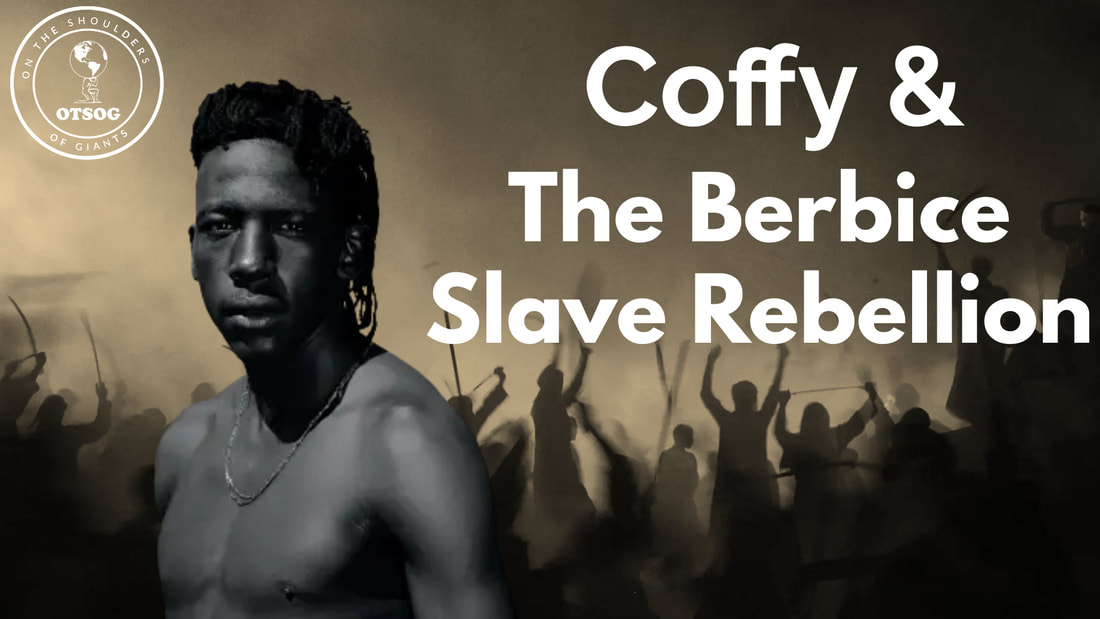|
Between the 1627 and 1792, the Dutch West India Company colonized a region between the Berbice and Canje rivers called Berbice, in the country of Guyana. Berbice was a small colony populated with around 3,800 enslaved Africans, 244 Indigenous Americans, and 346 white people, on 135 plantations. In addition to being a small colony, it was not very profitable, and resources were scarce at the time due to global European conflicts. In 1762, several of the Dutch soldiers patrolling the many plantation became sick due to a disease outbreak. The disease reduced the number of Dutch soldiers controlling the enslaved Africans. In July of 1762, plantation owner Laurens Kunckler traveled to Nassau, Bahamas. During his absence, the enslaved Africans raided his plantation and escaped into the interior of the country. According to my sources, a few of the Indigenous Americans helped Dutch soldiers attempt the recapture the Africans. A month later, the Africans were forced to relocate due to a lack of provisions. 1762 was also the year a number of the enslaved Africans attempted to rebel against the plantation owners and Dutch soldiers, but the rebellion was suppressed quickly. Though the rebellion was suppressed, the spirit of rebellion spread through Berbice. In 1763, due to the continued inhumane conditions and treatment, the enslaved Africans of Berbice revolted against the Dutch plantation owners. From plantation to plantation, Africans attacked and killed the Dutch to free themselves from slavery. Several plantations were set on fire as the Africans began revolting. The Magdalenenberg Plantation was burned down by the Africans enslaved on the plantation. They then traveled to fight the Dutch aligned with several Indigenous Americans along the Courantyne River. The Africans were defeated, but the rebellion was not over. At this point the Dutch had the advantage, that was until an African man enslaved in Berbice enters the picture. In February of 1763, Africans were leading a revolt at the plantation Hollandia, this revolt was a bit different because the Africans were organized as if they were a military. These Africans were led by an enslaved man born in Ghana named Coffy. Under the leadership of Coffy, the Africans began to gain victories and an advantage over the Dutch. Coffy and the African rebels were able to take control of the southern portion of Guyana while the Dutch took control of the northern portion of the country. The Africans controlled southern Guyana for 12 months. Dutch control of Guyana was being threatened by the growing number of African rebels. Dutch reinforcements arrived in the form of 100 soldiers. The soldiers and the rebels battled, the Dutch were able to recapture a portion of the southern territory they previously lost. By this time Coffy declared himself the political leader of the rebels, and a man named Accra was the military leader. On April 2, 400 rebels led by Accra attacked the Dutch soldiers and regained the southern territory lost to the Dutch in the previous battle. The rebels were better equipped for battle than the Dutch expected. In response to the rebel victories, Dutch reinforcements were brought in along with a plan to retake all of Guyana. While the Dutch were formulating their plan of action, internal strife was brewing between Coffy and Accra. They began to have opposing views on how to manage their relationship with the Dutch. Coffy wanted to formally create a truce between the Dutch and the Africans, Accra disagreed with the truce. Coffy contacted Governor van Hoogenheim to negotiate peace, the Dutch responded by saying that Coffy would have to wait 3 or 4 months for a response from Amsterdam. The attempt for peaceful negotiations caused a further rift between Coffy and Accra, so much so that the rebels split into two groups. Accra and his rebels were still attacking Dutch soldiers. Shortly after, Accra and his rebels attacked Coffy and his rebels. Following the battle between the rebel groups, Coffy ended his own life, leaving Accra as the official leader of the rebels. The Dutch continued to battle the rebels until the Dutch ended the rebellion in January of 1764. Soon after, Accra was overthrown and enslaved by the new rebel leader Atta. The irony in the story is that even though the rebels were fighting to free themselves from being enslaved by the Dutch, they still practiced slavery for status within their free colonies, according to my sources. Coffy was a leader with the idea of Africans being able to live in Guyana among the Dutch in peace, Accra never brought into Coffy’s idea. His idea was to gain freedom from the Dutch through war. Maybe Accra had a more realistic view of the Dutch, and his clash with Coffy was in line with gaining true freedom? Maybe Coffy’s idea of living in peace with the Dutch was something to help spark racial harmony? The tension between Coffy and Accra was detrimental to the success of the rebels. And the splitting of the rebels made them a weaker opponent to the Dutch. Without unity, we cannot gain true victories. Thank you for listening to the story of the Berbice Slave Rebellion. J.A. Ward Click here to support the OTSOG book series. References: https://en.wikipedia.org/wiki/Coffy_(person) https://en.wikipedia.org/wiki/Berbice_slave_uprising https://face2faceafrica.com/article/meet-cuffy-the-west-african-slave-who-led-a-1763-revolt-that-made-him-a-guyanese-hero https://ghanaianmuseum.com/the-berbice-slave-rebellion-of-1763/ https://www.aaihs.org/the-revolt-that-almost-overthrew-slavery/
0 Comments
Leave a Reply. |
Details
Categories
All
Click Here to join our mailing list
|
Contact Us: |
Connect With Us |
Site powered by PIT Web Design


 RSS Feed
RSS Feed



